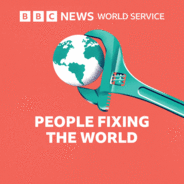
NachrichtenGesundheit, Wellness & Beauty
People Fixing the World Folgen
Brilliant solutions to the world’s problems. We meet people with ideas to make the world a better place and investigate whether they work.
Folgen von People Fixing the World
phonostar hat keine Informationen zu diesem Inhalt.
Gehe auf die Website des Senders um weitere Informationen zu erhalten.